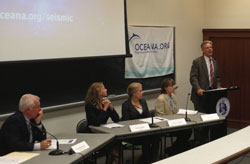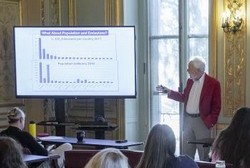A forum about the use of seismic air gun testing in the Atlantic Ocean was held in Young Auditorium on Monday, Sept. 16.
Representatives from Oceana, a non-profit organization that serves to protect and restore the world’s oceans, along with Tony MacDonald, director of the Urban Coast Institute, and Congressman Frank Pallone, gave a presentation last Monday about the detrimental effects of seismic air gun testing. This kind of testing is done by geophysical companies, whose efforts benefit oil and gas companies, as a way to search for offshore oil and gas.
Seismic air guns emit blasts of noise into ocean water that can detect the location of offshore oil and gas. These blasts can reach up to 250 decibels, which is 100,000 times more intense than the noise that comes from a jet plane, and have the potential to harm or kill marine life in the surrounding areas, according to Oceana’s “Stop Seismic Airgun Testing” campaign. Not only are these blasts excruciatingly loud, but they are emitted every 10 seconds, 24 hours a day, for days or weeks on end, the campaign adds.
According to Jessica Coakley, a Fishery Management Specialist on the Mid-Atlantic Fisheries Management Council, water is a very efficient medium to produce sound. These seismic blasts grow louder in the water and also have the potential to ruin the hearing of any marine animal in the area, which could lead to their death. For life in the ocean, hearing is imperative. “Fish use sound to aid to their navigation. They need it to survive,” Coakley elaborated.
Pallone spoke about the importance of this issue. “This is certainly an issue that needs more attention,” he said. “The impact of oil and gas drilling goes way beyond the immediate area.”
Pallone encouraged all those in attendance to write letters to the government and to do all that they could to raise objections about seismic air guns and ocean drilling. He was happy to hear that the University was getting involved and informing its students of this national environmental issue.
Nancy Sopko, an Ocean Advocate for Oceana, said that Oceana was able to obtain over 100,000 signatures on a petition to stop ocean drilling and testing. As of right now, drilling in the Atlantic Ocean has been postponed until January 2014. “If we can’t prevent it indefinitely, we can at least delay it,” Sopko said.
Instead of using offshore oil and gas deposits as sources of energy, men and women from organizations such as Oceana are trying to urge government officials to use clean and renewable energy sources. Renewable energy sources are not only a much cleaner and environmentally friendly alternative to offshore oil and gas, but they will also never run out.
One problem with renewable energy sources, however, is the cost. Sopko explained that implementing offshore wind along the coast would cost approximately $2.5 billion, and unfortunately, it’s incredibly difficult to attract investors.
To put it simply, Cindy Zipf, Executive Director of Clean Ocean Action said, “We don’t have as much money as big oil.”
A lot of investors are skeptical of these renewable resources, which makes it hard to find enough people who are willing to put their money into these alternatives.
Those at Oceana, along with many other environmental groups, are hoping that the Obama administration will decide against seismic air gun testing and offshore drilling and instead decide to use natural, energy efficient resources.
In the meantime, the University’s Urban Coast Institute is going to be working hard to make a difference. Because the University is in such close proximity to the ocean, the subject of offshore drilling hits very close to home. With that in mind, MacDonald assured everyone at the forum, “We are trying to be a center for oceanic issues here at Monmouth.”
PHOTO TAKEN by Erin McMullen




